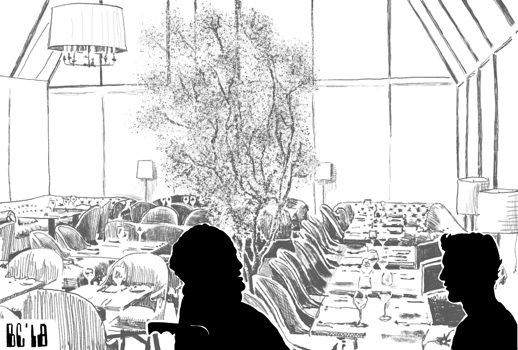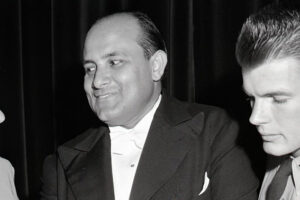

“I said he could take his big bag of Bagatini, and his Caterina Parr, and shove them right up—”
The night was wearing on at Ottolenghi’s Basement, an understated, warmly lit eatery on Madison Ave. Patrons—most loaded up on the specials du jour, truffle-anchovy crème fraiche on artisanal flatbread, wakame-infused roti in a coriander-shallot chimichurri sauce, cognac digestif—were now either opening their wallets or gathering their pelisses from the foyer.
To the rear, walls of tinted glass engirdled a heated portico-terrarium, where two figures could be seen polishing off the last of their Crêpes Suzette.
“And so you know what I told him?” Maestro Jerold Offerman snorted. He flourished his pastry fork. “I said he could take his big bag of Bagatini, and his Caterina Parr, and shove them right up—”
“That’s enough, Jerry,” chuckled Ingmar Anastomos, his attorney, despite himself. “Perhaps once we’re out the other side of this thing, we can talk physics.”
“Damned Carlos and his bel canto crapshoots. The dilettante! We already have Donizetti and Rossini on board this season. You know I told him hundreds of thousands of times that the gamble on unknown composers isn’t worth—”
“Jerry, that’s enough.”
“Remember what happened the last time he had his way, with my darling Lucia? Plunked it right down in the middle of Nazi Germany. The fucking Reich, Ingmar!”
Anastomos sighed. For the last two hours at the restaurant he’d done all he could to get his litigious client to focus and help make sense of the Algonquin Opera’s response to his recent lawsuit for wrongful termination.
The company had less than a week to go before the premiere of a new, more conservative staging of Lucia di Lammermoor. And a lengthy court battle lay in store for all parties.
Offerman, the company’s longtime Musical Director, faced multiple allegations of having engaged in illicit board game activity with company personnel, as well as with several young protégés he’d counseled in Akron and Montecarlo. There had also been that Hungry Hippos wheelchair assignation with a couple minors from the Boca Young Artists Program; he’d encountered them at the Fruits de Mer watering hole back in 2011.
In its tepid public response to Offerman’s lawsuit (off of which local gossip rag Ogler had had blown the proverbial lid, publishing in toto), the Algonquin’s special counsel wrote that it was “astonished at” and “deeply ashamed for” the Maestro’s “inability to leave personal animus out of what should have constituted a strictly professional parting of ways.”
(“ANIMUS???!” Offerman had exploded after perusing the statement, printed on corrugated printer paper in the law offices of Anastomos, Esq. Said printer-paper response, which had been hand-delivered by Offerman’s bewildered representation, had been promptly cast to the floor beside his wheelchair, theatrically spat on, emphatically shrieked at and anathematized. Nothing, nevertheless, could make it disappear.)
Anastomos, a well-intentioned if admittedly dour and humorless Greek-Cypriot who’d previously represented the likes of Woody Allen, Thelma Houston, Shelley Duvall, and Chic, was the kind of civil trial lawyer who’d routinely forego family vacations in order to spend more time with his clients.
To others it seemed pathological, his chronic need to be loved by clients, an condition which (compellingly enough for Anastomos’ long-suffering therapist) often eclipsed his need to be adored as a man of the law, a litigator, or to be seen as respectable by judges, or even lauded by colleagues for being on the right side of a tort.
All the same, Anastomos knew that Offerman would need to cough up considerably more in order to win his case. True, there seemed to be scant evidence that any round of Hungry Hippos or even Pinochle had been played during the conductor’s nearly four decades at the Algonquin; and yet all signs—from the lightning-quick investigation the company had conducted, to the insouciant verbiage of its response to the suit, to its plausible suggestion, plausible even to Anastomos, he had to confess, suggestion to both The Metro Times and The Metro Daily News that the dismissal wouldn’t have transpired at all in the first place if the company hadn’t already expected some adjudicating need to back their own claims in court—seemed to point to the Algonquin having something potentially explosive on his client.
Anastomos sighed. “Jerry. He may be a dilettante to you. But he could also be our ticket through this trial. I need you to tell me what you know about Carlos Alberti.”
“What I know about Carlos, Ingmar, is what everyone knows about Carlos! He was a nothing before he hit the Algonquin and started as general manager, before he started bullying me. A no one. The man was just a loser peddling has-beens and (Offerman flinched) crossover artists for Warner for years.”
“You’re talking about his time at the record labels. I understand,” his lawyer replied. “But think, Jerry. I need you to remember everything you can about his time at the Algonquin, and I mean everything.”
Anastomos folded his napkin and reached over to grab his briefcase.
“In the meantime. Here, I’d like for you to have a look at something. And I’d appreciate it if it could all be kept under your hat and between us, at least for now.”
Clicking open his attaché, he pulled out a sheet of neon yellow paper as well as what looked like a white laminated photograph. He turned the two documents over and slid them toward his client.
In turn, Offerman grabbed them, pushed his wheelchair away from the table, and squinted.
“Hold on, I’ll need my glasses for this,” he muttered, fumbling around in the dorsal pocket of his motorized transport.
His eyes widened as he perused what appeared to be the contents of a letter.
August 2016
Carlos, my darling,
Only one month has passed since our last tryst at the Languishing Ape Hotel Resort and Board Games Casino. And yet in the solitary weeks following your visit to Atlantic City, I feel the absence gnawing at me like a beagle with a large, insatiable bone.
If only I could find the vocabulary to describe the pinnacles of ecstasy you brought me to over our all-night rounds of tic-tac-toe, snakes and ladders, Clue, and pin the tail on the donkey. The incredible thrusts of inspiration as I moved each chess piece to match your stallions, your rooks, your fugitive queen—so slippery and elusive, so tough to capture, but in the end worth every agonizing moment of struggle.
I never met a man who could teach me the right way to play Boggle before I met you. Jiggling all the little pieces till they slid perfectly into place.
With the passing of each boring, lifeless afternoon, I sit alone by my window, dejected in my bathrobe, yearning and fantasizing in this cavernous dungeon of a place about peeking over the Battleship wall anew, glimpsing your handsome face. I cherish the vision. It’s all I have.
But I suppose I also have the dream that one fine day you will return to me, your Butterfly.
I know that I am but a modest intern, and will likely go unnoticed by a superior such as yourself as we pass each other backstage, or in the Algonquin’s storied hallways. But please understand that if ever love was, it once was for me. You made my first Scrabble special. And even if we are never to speak again, I want you to know: I will never be Sorry! for what we had.
Your forlorn little puzzle piece,
Chip
p.s. Enclosed, something to remind you I’m hot.
Shuffling the note, Offerman found a racy photograph of a young man wrapped in a kimono and wielding a parasol, with the words “Chi sarà? Chi sarà?” scrawled beneath the obi.
The former music director of the Algonquin Opera looked up and locked eyes with his attorney.
“So purple.”
“Pretty incredible, right?” chimed Anastomos. “Written right around the debut of the Rienzappo Butterfly. The kid was just a summer college intern then, running for the assistant managers.”
“How in satan’s hell did you find this?”
“Well, this is the best part, and I hope you’re ready,” declared Anastomos, triumphantly withdrawing an AmEx from his Varvatos wallet. “Carlos’ wife Flora found it in his home office.”
Illustration by Ben A. Cohen
























Comments